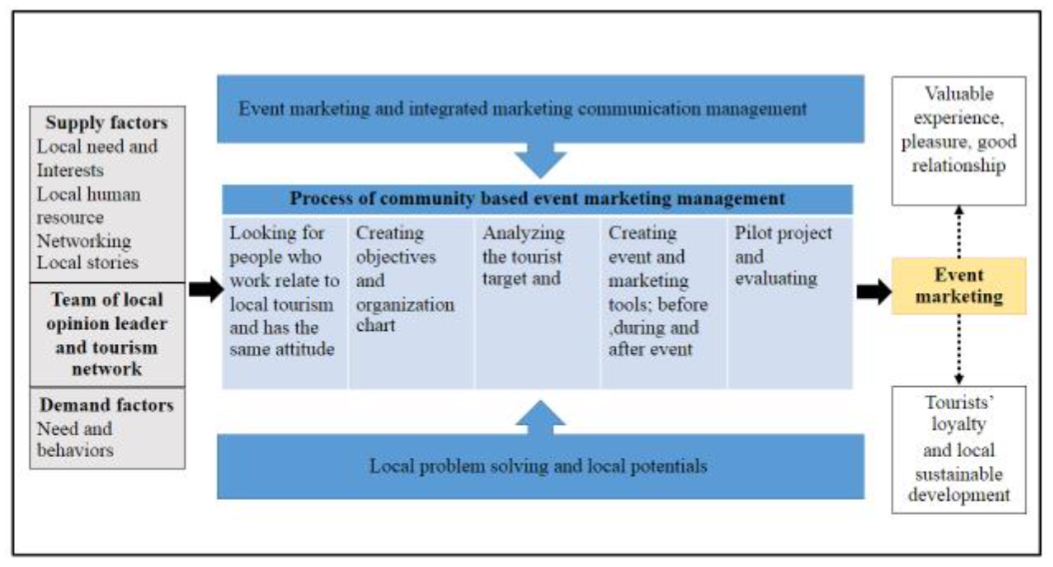Event marketing as an appropriately integrated marketing communication for promoting tourism of Ko Lad E-Tan, Nakhon Pathom Province, Thailand
Main Article Content
Abstract
The aim of this research was to create a model of integrated marketing communication for supporting community tourism in Ko Lad E-Tan, Nakhon Pathom Province. Grounded theory was used to collect the data from two sample groups. The first group consisted of stakeholders and locals. The second sample group was tourists. It was found that a wide variety of integrated marketing communication types were not run by government offces. All marketing and communication plans were based on previous plans which were thought to be ineffective. This research found that the local population in the sample group were interested in the use of integrated marketing communications. This study explains the potential of the local population for carrying out integrated marketing communications. These resources consisted of local human resources, local stories, communication channels and tourists. Moreover, this research has shown that event marketing is an appropriate model of integrated marketing communication which can be used effectively to support community based tourism. This is because it can respond the needs of the local population and it can solve tourism problems in this area. At the same time, the model can be used to communicate directly with tourists. This model can be used to boost the image of tourism and create loyal, revisiting, tourists. Finally, the research identified key factors for the success of community-based integrated marketing communication management in long term. It found that communications should be based on the local uniqueness as well as responding to needs and potentials of the local population. Importantly, it should also be focused on local budget, local human resources and should respond to tourists’ needs.
Article Details
References
K. Srisawang, M. Buaban, The guidelines for developing integrated marketing communication to promote tourism in Bang Luang Market and Community, Nakhon Pathom Province,Journal of Management Science Nakhon Pathom Rajabhat University 1(2) (2014) 15 – 29.
S. Pongsthapon, Practical IMC, Brandage Books, 2006.
K. L. Keller, Mastering the marketing communications mix:Micro and macro perspectives on integrated marketing communication programs, Journal of Marketing Management 17(2001) 819 – 847
J. Kliatchko, Towards a new definition of Integrated Marketing Communications (IMC). International Journal of Advertising 24(1) (2005) 7 – 34
M. Buaban, K. Srisawang, Potential of agriculture based desti-nations for developing creative tourism: A case study of Ko LadE-Tan, Nakhon Pathom Province, Thailand, Journal of Thai Interdisciplinary Research 13(1) (2018) 46 – 54.
K. Charmaz, Constructivist and objectivist grounded theory(2nd edition), Thousand Oaks, CA: Sage, 2000.
G. Belch, M. Belch, Advertising and promotion an integrated marketing communications perspective (7th edition), Boston:McGraw-Hill, Irwin, 2007.
K. L. Keller, Building strong brands in a modern marketing communications environment, Journal of Marketing Communications 15(2-3) (2009) 139 – 155.
P. Kotler, Marketing management (11th edition), Upper Saddle River, NJ: Prentice Hall, 2003.
S. A. Cohen, G. Prayag, M. Moital, Consumer behavior in tourism: Concepts, influences and opportunities, Current Issues in Tourism 17(10) (2014) 872 – 909.
K. Reanthong, Factors of tourist behavior in Umpawa, Smuth Sonkham Province, The thesis in Master degree of Siam University, 2013.
A. D. Miyazaki, A. G. Morgan, Assessing market value of event sponsoring: Corporate Olympic sponsor ships, Journal of Advertising Research 2 (2001) 9 – 15.
K. Charmaz, Constructing grounded theory: A practical guide through qualitative analysis, London: Sage Publications, 2006.
K. Lindroth, J. Ritalahti, T. Soisalon-Soininen, Creative tourism in destination development, Tourism Reviews 62(2007) 53 – 58.
B. Bramwell, B. Lane, Critical research on the governance of tourism and sustainability, Journal of Sustainable Tourism 19(4-5) (2011) 411 – 421.
P. Stern, Grounded theory, Thousand Oaks, CA: Sage Publications, 1994.


